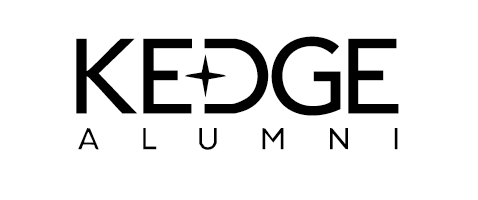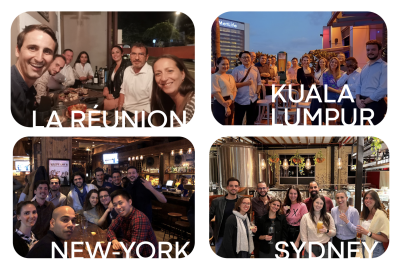News

Meeting with Elisabeth, Branch Manager and Entrepreneur in Kuala Lumpur
The students of the “KEDGE Alumni Travel” pro-act in Asia stopped by Kuala Lumpur, where they met with our expatriate graduates.
Graduation Year: 2006
Position: Managing Director
Company: All 1KL, Asia Career Management
Duration Abroad: 12 years
INTERVIEW:
Tell us a bit about yourself...
Elisabeth, 58 years old, with 30 years of experience, including around ten years in the institutional sector. From a young age, I dreamed of living in two countries: Russia and China. Although I don’t hold communist beliefs, I was deeply interested in understanding the economic planning systems and governance models in these vast nations. I strengthened my economics studies with a postgraduate degree in “European Economics” the same year the Berlin Wall fell. The collapse of the former USSR further motivated me to pursue my “first” dream and move to Russia. I stayed there until 1998, the year of a major financial crisis that affected emerging markets worldwide. I returned to France with the intention of moving abroad again—this time, specifically to China.
One morning in spring 2005, I suddenly decided the time had come to go to China, and I gave myself two years to prepare the project with my family. Living in the south of France, I chose to resume international studies and enrolled in an MBA at Euromed, which had a partner institution in China. This allowed me to spend two months in Shanghai and write my thesis on China. My husband and I searched for jobs in China from France for three years, and eventually, we arrived in Malaysia. It wasn’t China, but it was still Asia!
Can you tell us about your professional journey in Malaysia?
I arrived in Kuala Lumpur in August 2008 and found a job within just a few days by targeting companies that might be interested in my knowledge of the Russian language. I joined an Australian company that had to cease operations in early 2009 due to the financial crisis. Given the economic situation in 2009, which made it difficult to find employment quickly, I decided to start my own business.
I had initially noticed a lack of information and support for foreigners seeking employment in Malaysia, so I began working informally in that space. Six months later, I founded All1KL, Asia Career Management, where I still work today. Being self-employed turned out to be a work model that suited my expectations at this stage in life—offering flexibility and autonomy.
All1KL is a human resources consultancy serving both companies and individuals with career management in Malaysia and other Asian countries. I support businesses with recruitment and talent management, particularly during downsizing phases (Outplacement Services). Having previously served as Director of a Chamber of Commerce in France and being familiar with the local HR landscape, I also work as a service provider for the MFCCI (France Malaysia Chamber of Commerce) on behalf of its member companies.
This is a win-win solution: MFCCI can offer HR services to its members while reducing fixed costs, and I benefit from the visibility of the organization to connect with French companies. As a result, for several years now, I’ve worn two hats—one with MFCCI and one with All1KL—which can sometimes be confusing for companies unsure of which channel to use to contact me.
Why did you choose to move to—and ultimately stay in—Malaysia?
Asia is a region I truly appreciate. Generally speaking, I’m only drawn to emerging countries—places where things are constantly evolving! We’re in Asia at the right time. The world has changed significantly: my generation witnessed the end of the communist bloc, which was historically monumental, and we’ve seen the economic rise of many countries.
I first discovered Asia 35 years ago—everything was very different back then. Today, there are very few underdeveloped areas left. We’ve had the privilege of living through a time when the world evolved dramatically and rapidly.
You’ve had the opportunity to work in different countries—have you noticed any similarities or differences in your main responsibilities?
Since I’ve worked in emerging countries, I’ve often encountered similar challenges. Radical changes in population dynamics, economic models, resistance to change, and overall momentum—these environments tend to share common traits.
In Malaysia specifically, religion plays a significant role and can influence certain everyday rules. One common characteristic across emerging countries is the optimism of their populations. People generally believe they will live in better conditions than their parents and that many opportunities lie ahead. In contrast, in Western Europe, people often expect their generation to face more difficulties than the previous one. That’s something I really appreciate here: the optimism!
How was your integration into life in Kuala Lumpur? You targeted a sector that matched your profile well, which helped your job search—but do you think it’s easy for an expatriate to find work here?
My integration into Kuala Lumpur was smooth and quick. For foreigners today, the job search conditions in Malaysia have changed over the past decade, and my work at All1KL focuses on helping people adapt to this new environment.
However, it’s important to remember that in any job search, you must be very clear about your positioning: “I am this, I do that, I want to do this, I can offer that to this company…” Building your professional positioning is essentially marketing. Then, you need to identify target companies, initiate a commercial approach by contacting them, and know how to negotiate.
Expatriates—including KEDGE alumni or students—who reach out to me during their job search in Malaysia often tell me they’re “open to any opportunity.” But it doesn’t work that way! Companies are looking for someone who is immediately operational. It’s also important to keep in mind that there is a certain level of protectionism toward foreign workers. Therefore, you must convince potential employers that your skills are more advanced or more specific than those of a local employee.
Strong candidates know how to market themselves well, especially by using differentiation strategies that help employers remember their profile. Since 2015, we’ve seen a decrease—or even a reversal—in the salary gap between Westerners and Malaysians. More and more foreigners are coming to or want to come to Malaysia or Asia, and they tend to lower their salary expectations to increase their chances. At the same time, local employees—who will always be favored in the job market—are becoming better trained and more experienced, which drives up their salary expectations.
Was it difficult to start your business here?
Registering and setting up a business is a relatively straightforward process. The hardest part is keeping it running and especially getting past the critical 3- and 5-year milestones. In Malaysia, it’s possible to register a company with just 2 ringgits of share capital. However, to obtain a work visa, a capital of 500,000 to 1 million ringgits is required, depending on the sector. This is a significant constraint for anyone looking to start a business.
Since my husband and I didn’t plan to return to France, we decided to establish such a capital for All1KL, which allowed me to obtain a work permit. In 2012, I was granted a Resident Pass, newly introduced by the government to attract qualified foreign talent. This pass gives me a 10-year work authorization—much longer than the standard 2-year permit.
Do you have any advice for graduates and future graduates who want to move abroad and live internationally?
Absolutely! Work on your project and your positioning. It’s still possible to come here with just your suitcases—but you must be ready to embrace a new lifestyle and, above all, a new system. Candidates for expatriation, including younger generations who want to maintain access to French social security and retirement benefits, will now face greater challenges in finding a job abroad.
It’s much easier today to travel and live internationally. But as globalization grows, protectionist movements are emerging, and competition among expatriates is intensifying worldwide. People who have lived in a country for a long time and have a strong understanding of the local environment—including the language—have become “rivals” for newcomers who arrive without specific preparation.
Any company choosing between a newly arrived French candidate and another who has lived in the country for several years will—assuming equal qualifications—choose the latter to avoid relocation risks. Working internationally requires building a project as early as possible, ideally starting in 2020. In ten years, the presence of many long-established foreigners in the region could significantly hinder the “dreams” of new candidates.
Some young professionals choose to return to France after 2 to 5 years abroad. It’s important to understand that such a decision can impact their “international profile” status and reduce their attractiveness in the job market if they later wish to pursue another expatriation.
Interview conducted in Kuala Lumpur by Clémence, Stivell, Estelle, and Adel, students of the KEDGE Alumni Travel pro-act in Asia.
TO LEARN MORE ABOUT THE KAT PROJECT
FOLLOW THEM ON INSTAGRAM
FOLLOW THEIR JOURNEY ON FACEBOOK






